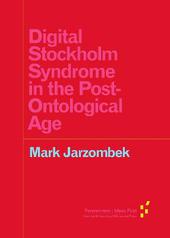
|
Digital Stockholm Syndrome in the Post-Ontological Age
Paperback / softback
Main Details
| Title |
Digital Stockholm Syndrome in the Post-Ontological Age
|
| Authors and Contributors |
By (author) Mark Jarzombek
|
| Series | Forerunners: Ideas First |
|---|
| Physical Properties |
| Format:Paperback / softback | | Pages:110 | | Dimensions(mm): Height 178,Width 127 |
|
| Category/Genre | Philosophy |
|---|
| ISBN/Barcode |
9781517901837
|
| Classifications | Dewey:111 |
|---|
| Audience | | Professional & Vocational | |
|---|
|
Publishing Details |
| Publisher |
University of Minnesota Press
|
| Imprint |
University of Minnesota Press
|
| Publication Date |
1 August 2016 |
| Publication Country |
United States
|
Description
Once, humans were what they believed. Now, the modern person is determined by data exhaust-an invisible anthropocentric ether of ones and zeros that is a product of our digitally monitored age. Author Mark Jarzombek argues that the world has become redesigned to fuse the algorithmic with the ontological, and the discussion of ontology must be updated to rethink the question of Being. In Digital Stockholm Syndrome in the Post-Ontological Age, Jarzombek provocatively studies the new interrelationship between human and algorithm. Forerunners is a thought-in-process series of breakthrough digital works. Written between fresh ideas and finished books, Forerunners draws on scholarly work initiated in notable blogs, social media, conference plenaries, journal articles, and the synergy of academic exchange. This is gray literature publishing: where intense thinking, change, and speculation take place in scholarship.
Author Biography
Mark Jarzombek is a professor at the Massachusetts Institute of Technology, where he has been teaching since 1995. He specializes in the history and theory of architecture.
Reviews"Provides a brief, yet stylistically ironic and incisive interrogation into how recent iterations of post- or inhumanist theory have found a strange bedfellow in the rhetorical boosterism that accompanies the alleged affordances of digital technologies and big data."-Boundary 2
|